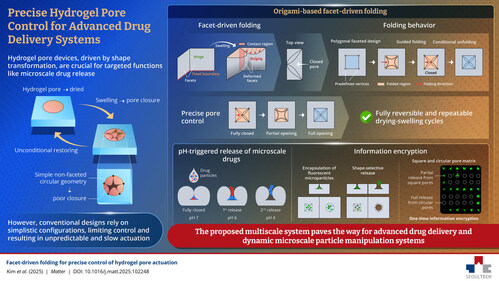Hydrogels are soft, water-rich polymeric materials that can swell or shrink in response to environmental stimuli. This ability to change shape makes them valuable in miniaturized devices for flexible electronics, microrobotics, intelligent surfaces, and biomedical applications such as drug delivery. For example, hydrogel pores can be engineered to trap and release tiny drug particles on demand.
However, most current hydrogel pores use circular designs, which limit control over shape change and lead to unpredictable, slow actuation. They often close unevenly and recover poorly, reducing their precision and reliability.

